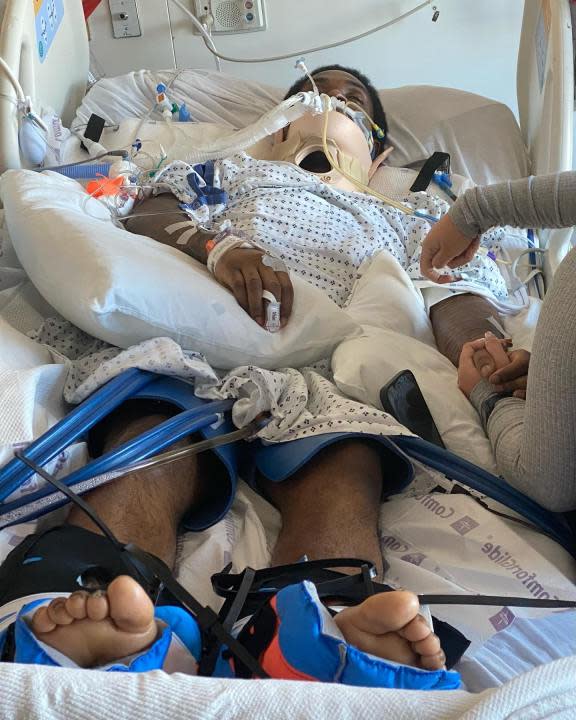‘They wanted to remove him from life support’: Mother demands answers after son suffers trauma in federal prison
OKLAHOMA CITY (KFOR) — LaDana Duncan-Johnson said her son Michael was serving time for a bank robbery when he was sent to the Federal Transfer Center (FTC) in Oklahoma City.
The FTC is a federal Bureau of Prisons (BOP) facility that temporarily houses federal inmates who are in transit to other facilities or awaiting hearings related to their cases.
Then she got a call from prison staff.
“I was notified that something happened to my son, that he was brain dead, and they wanted to remove him from life support, and I said absolutely not,” she said.
Due to the assault, LaDana said Michael was left with a Traumatic Brain Injury associated with Hypoxia (lack of oxygen) and can no longer walk, talk or do anything for himself.
She says the prison told her Michael’s injuries were from a suicide attempt.
“He doesn’t have but a few years to go before he comes home,” she said, adding that he’d served nearly twelve years of a seventeen-year sentence.
“Why would he hang himself ?,” she continued.
She’s gotten few other answers, but what the staff said didn’t line up with what she saw; the mother now believes Michael may have been assaulted by FTC staff.
“He had defensive scratches all over his left shoulder [and] down on his chest. He had blood on his wrists as if he had been handcuffed to something. Both his knees were scraped. And I said, ‘What is this? Because I know that this does not come from hanging’.”
“When I inquired about those injuries, I kind of got silence,” she added, while saying Michael did not have typical hanging injuries.
Medical professionals who treated Michael were afraid to go on camera, but said they believe he was beat up.
“He’s still fighting, which is why I’m here. I want to make sure that we get justice for my son. He deserves that. He didn’t deserve this,” LaDana said.
In a statement to KFOR, the Federal Bureau of Prisons said the agency does not discuss any individual in their custody:
For privacy, safety and security reasons, the Federal Bureau of Prisons does not comment on or discuss the conditions of confinement for any individual in our custody, including their health status.
—Office of Public Affairs, Office of Congressional and Public Affairs, Federal Bureau of Prisons
But this isn’t the first time claim of wrongdoing at the facility.
Back in 1995, there was a high-profile case, claiming Kenneth Michael Trentadue’s death by hanging may have been a cover up for murder.
Kameron Jenkins, wanted for shooting deputy and death of bystander, found dead
Trentadue died at the FTC on Aug. 21, 1995. Located in Oklahoma City, the FTC is a Bureau of Prisons (BOP) facility that temporarily houses federal inmates who are in transit to other facilities or who are awaiting parole revocation hearings. According to FTC correctional officers, at approximately 3:00 a.m. on August 21, they found Trentadue hanging by a bed sheet around his neck from a grate in his cell. FTC staff treated Trentadue’s death as a suicide.
Following a series of investigations over three years, investigators said the man died by suicide, but found the Bureau of Prison’s response to what happened was “significantly flawed”:
As a result of our review, we concluded, like the Medical Examiner and the Oklahoma County District Attorney, that Trentadue’s death was a suicide and that he had not been beaten and murdered by correctional officers or inmates. We did not find that the BOP participated in any conspiracy to cover up his death, as some have alleged. But we did find that the BOP’s response to his death was significantly flawed. FTC employees made various mistakes, including delaying their entry into Trentadue’s cell, attempting to videotape the scene rather than immediately providing medical attention to Trentadue, failing to assess Trentadue’s condition properly, failing to inform the FBI expeditiously and fully about the circumstances of his death, and rushing to clean the cell the day of his death.
—A Review of the Justice Department’s Handling of the Death of Kenneth Michael Trentadue at the Bureau of Prisons’s Federal Transfer Center in Oklahoma City, December 1999
“The inhumane treatment, the assaults happening in jail, the deaths in jail, we have to stand up,” said LaDana.
As for Michael, he was released from prison because he needs round-the-clock care.
“I’m not only speaking up for my son, but I’m speaking for all the other men that are in prison,” LaDana said, nearly a year later.
She wants the Bureau of Prisons to do a full investigation into what happened to her son.
A GoFundMe has been set up to help offset long-term costs for the family.
“This doesn’t make any sense that I gave them my child walking and talking in his right mind as a whole person and they gave him back to me in the worst condition that you could give anybody,” she said.
For the latest news, weather, sports, and streaming video, head to KFOR.com Oklahoma City.
